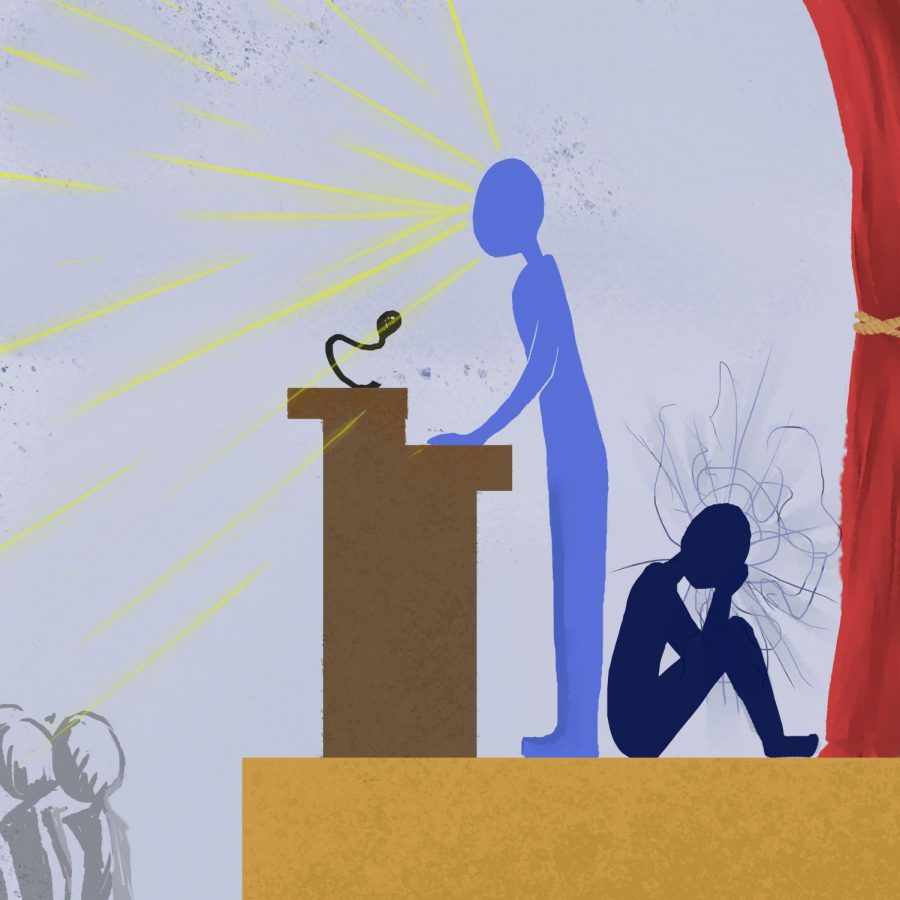Fight or Flight: The Fear of Public Speaking
STRENGTH OR SHORTCOMING About 25 percent of American grapple with the fear of speaking in public and the symptoms caused by it. Although some would rather avoid the task at all costs, others have learned to master the skill through exposure and practice.
January 30, 2019
Individuals have strong opinions about public speaking; addressing an audience either comes naturally or one would rather avoid it at all costs. When people traditionally think of “public speaking,” they envision an individual at a podium speaking to a considerable crowd. However public speaking can take many forms such as giving a presentation to your class or sharing one’s ideas to colleagues. According to Psychology Today, glossophobia, or the fear of public speaking, affects 25 percent of Americans. People with this phobia dread speaking in front of others and often find themselves shaking, perspiring excessively and even feeling nauseous. Personally, I am not a strong public speaker. I typically struggle with articulating my ideas when addressing an audience and often stutter while speaking at an accelerated pace. Even getting called on in class makes me nervous, as I want to prepare everything I have to say before speaking to others. I hoped that writing this article would allow me to do some research and talk to students who excel at speaking in public and others who have similar feelings as me when giving a presentation, so that I could learn more about something I dread so much.
In general, people fear speaking in public because they worry about embarrassment. Especially when giving a presentation in class, individuals want to impress their audience and appear cool, calm and collected. Sophomore Thomas Tastad explains that the pressure of giving a flawless speech causes people to dislike public speaking so much: “You could have everything down on a piece of paper but then you get up there and think ‘People are looking at me and I can see your faces. And I don’t want to feel judged and I want to fit in.’” People enhance their nervousness to deliver a speech when they think about everything that could possibly go wrong. Yet, if something negative does occur during a class presentation, chances are that no one will remember it. Personally, I can remember countless examples where I made too long of a pause, pronounced a word incorrectly or made minimal eye contact, and yet I struggle to remember specific times when my peers did the same. The mistakes that are monumental to you typically have little impact on others.
Accenton Business explains that when we are put in a situation that seems threatening, our limbic system, or a network of nerves in our brain, notifies our “pituitary gland to secrete the stress hormone (along with 30 others), initiating the release of epinephrine and norepinephrine.” This gives us an energized feeling that can make us anxious. Your pupils dilate, your heart rate increases, breathing becomes quicker and muscles become tense. Because your blood vessels also dilate, your face and neck can turn red. This reaction to a dangerous situation was to stimulate your fight or flight response; they could either battle the threat or flee from it. According to Accenton Business, “these very real physical symptoms” are able to “clog [some people’s] brain’s ability to guide rational thought and steady body movements.” It is challenging for many to combat these symptoms that naturally plague people who are concerned with giving a speech.
Speaking in front of a class is almost unavoidable. When I asked students what their least favorite speech was to deliver, they could easily come up with an answer; a detailed book report in eighth grade or a group presentation in English sophomore year. Yet when I asked people about their favorite presentation, people rarely could remember one they believed went well. For many, public speaking has a pretty negative stigma. For many it is pretty overwhelming; when preparing for a presentation in class, teachers usually give a brief introduction to what makes a strong speech. Students are told to scan their crowd to avoid staring at their notes, maintain a confident posture while utilizing engaging hand gestures, be well practiced, but still be able to summarize to keep people interested, the list goes on. Composition Logic explains that people “fall into a trap of confirmation bias” where they try “something at [their] next presentation and if it goes relatively well then [they] think ‘oh that went well’ and it becomes part of our repertoire.” Individuals will then emphasize to others that they have the best strategies of how to deliver a speech. Although it is helpful to know a plethora of tips, it is also important to realize that strategies that work for some may not be the best for others. For example, junior Julia Park explained that having a presentation visual for her speech and “being able to interact with that and point things out” helps makes her speech more engaging. There are numerous different strategies that make a strong speech, but through trial and error, one can determine what works best for them personally.
Although delivering a speech is very important, the written speech itself is vital to an effective presentation. The best speeches are the ones that are able to balance finding an appropriate tone when giving a speech to a certain audience. Freshman Jack Lopez says that effective speeches are able to properly summarize major points because “you get up there and you just want to summarize as quickly as possible. You have to practice summarizing so that is sounds natural and you still get all the facts across.” An intriguing introduction is also invaluable to an effective speech as it sets the tone for the whole presentation. Sophomore Rosie Chen says that she thinks about the overall flow of the speech so that she is not abrupt when changing topics and her audience can easily comprehend her speech’s direction. Chen also explains, “I also think about not using a lot of personal pronouns. I heard a specific quote that was kind of interesting, that ‘The less important someone makes themselves, the more important they seem.’”
Throughout history, there have been numerous examples of strong public speakers. People typically think of Martin Luther King Jr and Barack Obama when envisioning well-known public speakers. Freshman Sara Kaminski explains that “a strong voice” is a characteristic of a strong public speaker, as well as “confidence.” According to Kaminski, “I don’t think you need to go over something a million times before you do the presentation to walk in with confidence. I feel like it’s something that’s just there.” A natural poise makes an audience more receptive to what one wants to say. Leaders are able to persuade and educate crowds when they embody confidence and believe in what they are saying. Even if you are not delivering a speech to an enormous crowd, public speaking is important in both your personal and professional life. Chen believes that its importance “depends what field you’re in, but it’s definitely a good soft skill to have. I think that even being good at speaking to people in general, or social interaction is important.” Senior Ellie Brennock agrees that public speaking takes a more prominent role in someone’s life depending on their profession, but in people’s personal lives it can be very important. Brennock says, “You could be talking at a wedding and can help with relationships. Overall, if you ever want to keep rising in your field, you have to be able to share or communicate your ideas.”
But how do people overcome their fear of public speaking? People often say the best way to overcome one’s fear is to face it. As painful as it may seem, you will not magically become a better public speaker by doing nothing. Even if you are watching other people give speeches, you can only truly become better yourself by giving your own speeches. Sophomore Connor O’Brien also says, “I think a big thing is learning that being nervous is unavoidable. A lot of people try to say ‘Oh don’t be nervous, it’s not a big deal,’ but that’s not going to work. What you need to do is kind of slowly expose yourself to more and more nerve wracking situations and you’ll get used to it. You can’t really avoid that feeling, but you can get used to it and handle it properly.” Exposure is the key to overcoming this fear. Yet you can start small; share out your ideas with smaller groups and then eventually to your whole class to gradually become more comfortable with talking in groups. Senior Richard Jia is in Junior State of America, or JSA, and has become more comfortable with addressing crowds. Jia says, “You get really good at coming up with an argument on the spot and I can express what I’m thinking about on the spot. Instead on spending a lot of time to prepare, you can just get better at it.”



